Gun Violence

What do we do? How do we stop this?
“Motorists and walkers scattered in terror Monday night as a gunman fired two bursts of bullets at passing vehicles near an Oakdale grocery store, killing a 10-year-old boy and wounding two other people. Click HERE for the Star-Tribune story.
We can‘t stop it. America is an arsenal with an open door. And any attempt to close the door is “unconstitutional.” Liberty, one of three basic rights outlined by The Declaration of Independence, is killing the other two. “Liberty” trumps not only “the pursuit of happiness” but “life” itself.
“At least two vehicles struck by bullets sped into the parking lot of the nearby Rainbow Foods at 7053 10th St. N. seeking help.”
Responsible gun owners did not do this. An irresponsible gun owner did this. But it would have made not one ounce of difference if the passersby had been armed. They were sitting ducks, like the ducks in a carnival booth. There is no protection against irresponsible use of a firearm.
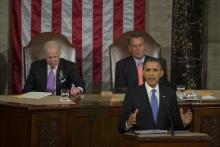
There was truth tonight in the president’s State of the Union message.
There was truth that the rising costs of health care must indeed be addressed by serious reforms in our Medicare and healthcare system — but that it’s wrong to put most of that burden on vulnerable seniors, while protecting the most powerful special interests. Truth that you should not reduce the deficit by cuts in crucial investments in education, infrastructure, science, clean energy, or programs for the most vulnerable — but leave billions of dollars in tax loopholes and deductions for the wealthy and well-connected.
Truth in the compassionate and committed words about “poverty” and “poor” children and families who deserve our attention to find ladders up from poverty. Truth that no one who works full time in the wealthiest nation on earth should have to live in poverty but have a living wage. That quality pre-school should be available to every child in America to create stable and successful families.
"I urge lawmakers to press for comprehensive and universal background checks for firearm ownership, regardless of where and how a gun is purchased; for bans on the availability to civilians of assault rifles and high-capacity magazines; and for policies designed to better regulate the manufacture of guns,” the Presiding Bishop states in her testimony. “The Episcopal Church also supports the highest level of accountability for violation of all existing laws pertaining to violence in our midst.”
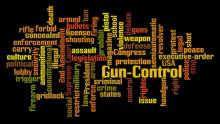
Red, white, and blue. Pick-up trucks. Apple pie. Baseball. Church on Sunday. And guns. You can't get much more American than that, or so it seems here in Montana. This week a regional newspaper posted on Facebook looking to find proponents of greater gun restrictions for an article they were writing. Within minutes the request was laughed at, belittled, and deemed unlikely. Truth is, even if someone did lean toward greater gun control, they never would have publicly responded. To utter such absurdities is equivalent to branding yourself anti-freedom, anti-American, and even anti-Christian. To listen to the rhetoric, gun control of any kind is nothing more than an eager embrace of Nazi-fascism, Chinese-communism, and the demise of all things American. And surely God would disapprove.
Which makes me wonder: what would God say about gun control? Not in some sort of glib WWJD-type platitude, nor in an entangled concoction of American freedom and Christian theology. And definitely not in a sensationalized proof-texting approach to scripture. But honestly, can our faith inform this conversation? And should it?
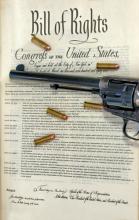
How did this gun-owner-since-he-was-eight find himself at a prayer vigil to end gun violence on the steps of the Michigan state capitol? The easy answer is that Michigan Prophetic Voices, a nonpartisan, statewide organizing clergy group invited me to be there. But I had another reason.
In my family owning a gun was explained as a rite of passage, not as a Second Amendment right. When my father handed me my first gun he said, "You are old enough now to learn how to use this safely. There is one thing you have to promise me: never point it at anyone. If you do, I will take it away for good." I made the promise.
The man who said those words had heard different words from his father. "Never steal another man's property," my grandfather had told my dad, "and if it's yours, you fight like hell to keep it."
Those words shaped events of an early August morning in the 1970s when both of those men leveled shotguns at would-be burglars in the family business and, out of fear for their own lives, fired. One of those 20-something men was killed.
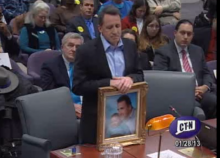
We know we are addicted to something when that behavior damages our relationships with people. When alcohol, drugs, food, gambling, or work is more important than mother, father, husband, wife, child, friend, or neighbor, we know we have a problem. Similarly, we know that we are worshipping an idol when a created thing becomes more important than the Creator, when we put our faith in our fears and a dead thing that cannot love us back becomes the object of our ultimate concern. We know we are worshipping an idol when our devotion fails to cause us to love and to respect our neighbor.
In a Connecticut hearing about gun violence, Neil Heslin — a father whose son died in the mass shooting at the Sandy Hook Elementary School —asked why any one individual citizen needs military-style assault weapons and high-capacity magazines. People in the room answered by quoting the Second Amendment. In this case, the Second Amendment was more important than this father’s pain. Their lack of respect for his pain indicated a deficit of both compassion and love, not only for this grieving father but for a grieving nation.
Let us be clear. The Second Amendment is not holy writ, and a gun is not God. Far too many Americans have made these created things, these inanimate objects more important than the compassion we ought to have for one another. This is fetishism. This is idolatry. This is morally wrong.
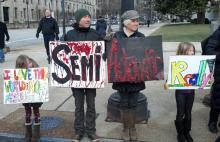
So you might think that religious folks for the most part are not big fans of guns, and for the most part you’d be right.
And then you run across these comments from a California legislator, who said guns are “essential to living the way God intended.” That was Rep. Tim Donnelly, who told a Christian radio show Jan. 16 that guns “are used to defend human life. They are used to defend our property and our families and our faith and our freedom.”
Well, yes, guns are used that way. They are used in lots of other ways too — to kill people we don’t like, to hold up banks, to commit suicide. It’s harder to wrap those under the banner of God’s intent.
For Christians, it’s hard to square the deification of guns with Jesus telling his followers to put away their swords, even as he was being arrested and led off to death.
That’s why a wide coalition of religious voices are speaking out in the great national debate about how we can live up to the Second Amendment’s call for having a “well-regulated militia.” Notice the words “well-regulated.”
As the Very Rev. Gary Hall, the new dean of the National Cathedral in Washington, D.C., said two days after the horrific shootings at Newtown: “I believe the gun lobby is no match for the cross lobby.”
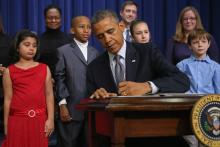
When I was a little girl, my mother and I prayed together every night:
Now I lay me down to sleep.
I pray the Lord my soul to keep.
If I should die before I wake,
I pray the Lord my soul to take.
And then I would ask God to bless a list of people who were on my mind.
Every night I spoke about my own death, but death was not real. It never occurred to me that I would die or that my parents would die.
One day when I was in the fifth grade, we heard gun shots outside our school. Our teachers did not let us go outside for recess that day because a woman had been killed, caught in the crossfire of a domestic dispute between her son and his wife. By the time school was out, the body had been removed; there was no yellow crime scene tape. There was still blood on the ground to mark the spot of this tragic death. The next day it would be washed away.
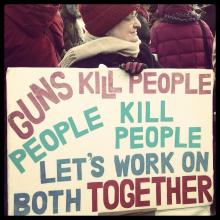
Over the weekend I joined more than 6,000 people in a march for common sense gun control legislation.
The ground was covered in snow and ice, air so cold we could see our breath, on Saturday morning as we marched silently from the Capitol Building to the Washington Monument. In front of me, 100 residents from Newtown Conn., carried signs that read, “We Are Sandy Hook.” By my side stood an elderly woman with a sign reading, “Guns kill people. People kill people. Let’s work on both TOGETHER.”
Behind me, beside me, and scattered throughout the crowd of silent marchers more than 1,000 simple white signs were also displayed — carrying the names of victims of gun violence who have been permanently silenced.
They were names like Charlotte Colton, a mother of three who was gunned down along with seven other people at a U.S. Postal Service facility in Goleta, Calif.
Names like Laura Webb, who was shot and killed in a salon while styling her mother’s hair in a massacre that killed eight people.
Names like Vanessa Quinn, 29, one of four victims gunned down in a mall in Utah while she was picking out her wedding ring.

The pressure from the faith community on Congress to address gun violence is building. There have been vigils, marches, and press conferences. Faith leaders have visited the White House and lobbied on the Hill. Now, an interfaith call-in day is being organized on Feb. 4 to ensure Congress hears directly from people of faith demanding change. This is a chance for your voice to ring through the halls of Congress.
While the debate on sensible gun restrictions has continued, local evening newscasts continue to run stories highlighting yet more tragic deaths from gun violence. We need more than a conversation. We need Congress to find the courage to lead.
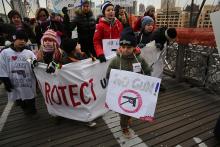
Much has been said, since the massacre at Newtown, Conn., about our American culture of violence. It is no exaggeration. In 2012, the United States had three mass shootings within six months. According to a study published in the Washington Post, our nation’s gun murder rate is roughly 20 times the average of all other developed countries.
We should not be surprised. Not only have we created a culture of violence, we glorify violence in our movies, television shows, and video games. Even in pro sports, players increasingly settle disagreements on the court or field with physical altercations, reinforced by the cheers of raved fans.
The huge surge in gun sales, after President Barack Obama announced his intent to have Vice President Joe Biden make recommendations to curb gun violence, attests to the misguided fears of many Americans.
We have a paranoid citizenry who, like Sen. Rand Paul (R – Ky.), mistakenly falls into the delusion that arming more people with guns is the answer.
So here America is, coping with this assault on our sensibility, at a time during the year when we celebrate the teaching of the great civil rights leader the Rev. Dr. Martin Luther King, Jr. It was King who successfully applied the force of nonviolent resistance to end segregation in America, and it is his voice we must listen to in this time of increasing violence in our culture.
“Idolatry of guns.” What does that mean, exactly?
It might be hard to admit, but if you think about it, you can see that many groups in the United States see guns as sacred. Guns are not only the solution to our problems, they will save us from evil. Wayne LaPierre, the executive vice president of the National Rifle Association, stated this himself: “The only thing that stops a bad guy with a gun is a good guy with a gun.”
Do we really believe this? If we stop and think about it, we don’t. Our protection does not come from guns, and we do not live in a binary society of good and evil, where the right to hold dangerous weapons can be allocated to people who are entirely virtuous.
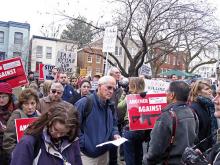
When I was in high school, my family moved from a Black Chicago Southside neighborhood fraught with gang tensions to a nice, multiracial middle-class community further south. Yet, my mom and dad still drove my brothers everywhere, so they would not get shot walking to the basketball court or to a friend’s home because of their shoes, their coat, or the color of their shirt. It was the ’70s and Marvin Gaye’s anthem asked the question on the minds of a generation: What’s going on?
Decades later, it is still my question. Six Sikhs killed in worship in Wisconsin. Thirty-three shot dead at Virginia Tech. Twelve killed and 58 injured in a movie theater in Aurora. One teacher and 12 students at Columbine. Six women, eight little boys, and 12 little girls in classrooms in Newtown. Those babies still had their baby teeth. What’s going on?
Marian Wright Edelman, president of the Children’s Defense Fund, cites these stats in her recent Huffington Post blog: 119,079 children and teens have been killed by gun violence in our nation since 1979. It is as though 4,763 classrooms of young people have been killed by guns. Twenty-two times more children and teens have been killed since 1979 than military personnel in the Iraq and Afghanistan wars combined. That cracks my heart wide open.
The shootings at Sandy Hook took our breath away. We felt in our hearts, this could happen to my child, to my neighbor’s child, and in my community. Unfortunately, in many communities, like my neighborhood in Chicago, we’ve known for a very long time that our children were in the line of fire.
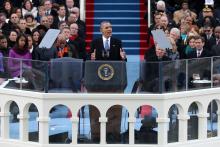
I attended the Inauguration Ceremony today. It was thankfully not as cold as last time. But it was one of President Barack Obama's best speeches — strong, clear, even tough, in a good way. My favorite line was: "… history tells us that while these truths may be self-evident, they’ve never been self-executing; that while freedom is a gift from God, it must be secured by His people here on Earth."
In other words, God has made those principles always presented at inaugurals "self-evident" or ordained; but human beings must implement them. The president is saying that it is up to us to do that in our time. He elaborated. He was specific.
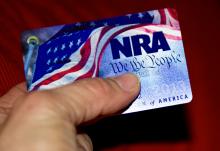
Tuesday was the 84th birthday of Rev. Dr. Martin Luther King, Jr. I don’t know about you, but I miss his words, so I offer a few. King said “people often hate each other because they fear each other, they fear each other because they don’t know each other, they don’t know each other because they cannot communicate, they cannot communicate because they are separated.” I would add to his words: ‘and in that separation they seek guns.’ As an evangelical Christian, I’m going to make this theological.
Wayne LaPierre, executive vice president of the National Rifle Association, said this as his response to the massacre of children at Sandy Hook elementary in Newtown, Conn.: “the only thing that stops a bad guy with a gun is a good guy with a gun.”
That statement is at the heart of the problem of gun violence in America today — not just because it is factually flawed, which of course it is, but also because it is morally mistaken, theologically dangerous, and religiously repugnant.
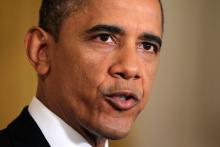
President Barack Obama and Vice President Joe Biden announced today a comprehensive plan to address gun violence in the wake of mass shootings in Newtown, Conn., and Aurora, Colo. The plan includes calling on Congress to require universal background checks, restore a ban on military-style assault weapons and 10-round limit to magazines, and implement stronger punishment for gun trafficking. The plan also includes measures aimed at increasing school safety and access to mental health services.
"This is our first task as a society: keeping our children safe. This is how we will be judged," Obama said, accompanied children who wrote to the White House calling for an end to gun violence.
In the 33 days since the Sandy Hook shooting, "more than 900 of our fellow Americans have reportedly died at the end of a gun," Obama said. "… every day we wait, that number will keep growing."
Biden, who has met with more than 200 groups representing various interests including law enforcement and people of faith, said the nation has a "moral obligation" to do everything in its power to address gun violence.
The announcement comes a day after faith leaders, including Sojourners president and CEO Jim Wallis, publicly called for many of the same measures, including reinstating the assault weapons ban, closing background check loopholes, and making gun trafficking a federal crime.
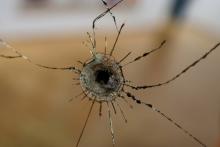
Violence does not equal power.
Martin Luther King, Jr., understood this. Yesterday was King’s 84th birthday. This year the national holiday to honor him will coincide with President Barack Obama’s second inaugural ceremony. And, all of this happens in the wake of one of the worst mass shootings in the nation’s history. One month after the shootings at Sandy Hook Elementary School in Newtown, Conn. — which left 20 children and six adults dead, plus the killer’s mother, found dead in her home — the country grapples with the issue of gun violence. If the country is to come to consensus on the issue, we will have to distinguish between violence and power.
Vice President Joe Biden gave recommendations to the president regarding gun safety on King’s birthday. The questions the media are asking already abound: What recommendations can the president implement through executive order? Can an assault weapons ban pass Congress? Will victims and gun safety advocates be able to persuade Congress to pass meaningful legislation?
There will be varying interpretations of the Second Amendment, and there will be some who will argue that guns are necessary for self-defense. We will have the discussion as to whether or not the gun culture in the United States has taken on religious proportions.
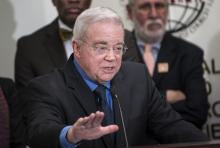
WASHINGTON — Dozens of the nation’s faith leaders said on Tuesday that they’re ready to take on the gun lobby and demanded that politicians take quick and concrete steps to stem gun violence.
At a Capitol Hill press conference and in a letter to Congress, more than 45 clergy and heads of religious groups — representing the spectrum of American religious life — petitioned lawmakers to reinstitute a ban on assault weapons, require background checks on all gun buyers, and make gun trafficking a federal crime.
Organized by the two-year-old coalition Faiths United To Prevent Gun Violence, the signers said the slayings at a Newtown, Conn., elementary school last month had pushed them to redouble their efforts, and created an opportunity to beat back the gun lobby.
The Rev. Jim Wallis, the evangelical who heads the progressive Christian group Sojourners, took on Wayne LaPierre, the outspoken executive vice president of the National Rifle Association, directly.
LaPierre’s statement after Newtown that the “the only thing that stops a bad guy with a gun is a good guy with a gun” is “morally mistaken” and “religiously repugnant,” Wallis said.

At Sojourners, people are just getting back from their holiday breaks with their families and some will still be out this week. D.C. public schools don’t even start until next week for my two boys.
Of course, members of the Senate and the House of Representatives came back early to avoid sending the nation off of the “fiscal cliff.” For the first time in two decades, taxes were increased for the wealthiest two percent, something most Americans support. And programs the Circle of Protection seeks to protect for the most vulnerable, including important tax credits that have kept millions of Americans out of poverty, were kept safe in the final deal.
The legislators barely succeeded in coming to a compromise but largely avoided the more challenging issues of the automatic spending cuts known as “sequestration” and an agreement on long-term deficit reduction. The compromise delayed the sequester for two months, which means it will kick in around the same time as an anticipated debt ceiling fight in which Republicans say they will force the nation into default unless they get the spending cuts they want.
As reflected in this deal, I applaud the President's continued commitment to protect poor and vulnerable people. I encourage him to remain steadfast in his refusal to negotiate. However, it remains to be seen whether the President will continue on in his refusal to negotiate on such important matters with those risking our nation’s economic health to advance their own political ideology.
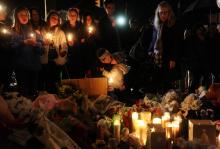
Our deepest question now is whether what happed on Friday — and what has focused the attention of the entire nation — will touch the nation’s soul or just make headlines for a few days.
I think that will be up to us as parents — to respond as parents. The brutal shooting of 20 six- and seven-year-old school children in their own classrooms touches all of us, and as the father of two young boys I’m especially struck how it touches parents. From the heartbreak of the parents in Newtown to the tears in the eyes of Barack Obama as he responded — not just as the President, but also as the father of two daughters — to the faces of the first responders and reporters who are parents. I have felt the pain and seen the look on the face of every parent I have talked with since this horrendous event occurred. Virtually every mother and father in America this weekend has turned their grieving gaze on their own children, realizing how easily this could have happened to them. The emotions we’ve seen from the Newtown parents whose children survived, and the feelings of utter grief for those parents whose children didn’t, have reached directly to me.
Saturday, the day after the Connecticut massacre, Joy and I went to our son Jack’s basketball game. The kids on the court were all the same ages as the children who were killed on Friday. I kept looking at them one by one, feeling how fragile their lives are.
Our first response to what happened in Newtown must be toward our own children. To be so thankful for the gift and grace they are to us. To be ever more conscious of them and what they need from us. To just enjoy them and be reminded to slowly and attentively take the time and the space to just be with them. To honor the grief of those mothers and fathers in Connecticut who have so painfully just lost their children, we must love and attend to ours in an even deeper way.